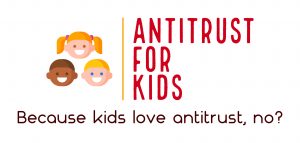Author: Molly Donovan
For adults, it’s the worst idea imaginable for a holiday, but for second graders, Valentine’s Day is great—decorating mailboxes, making paper cards and distributing treats to all your friends.
This year the second graders had an idea for making Valentine’s Day even better: a contest to see who can make the best Valentine’s cards! The kids would vote for one winner after sorting through all the cards to judge whose was most creative and best executed. The winner would have the prestige of winning.
As with all competitions, big or small, things should be fair. One thing that is not fair: copying another friend’s idea.
But that is what happened (as these Antitrust for Kids stories tend to go).
Mikey had made valentines out of actual waffles that read in frosting “I like you a waffle lot.” OMG. Could anything be cuter?
The day before Valentine’s, his mom posted the waffle photos on Instagram.
When Nora saw the post, she knew her cards (plain old paper, largely uninspired) would never win. But Nora HAD TO win.
She whipped up a batch of pancakes as quickly as she could and wrote on each in whipped cream: “I like you a waffle lot!” (Obviously, she didn’t nail it with the pun, but since the joke was lost on most of the kids anyway, it didn’t really matter.)
Nora’s mom (naturally) posted the pancakes on Instagram later that night with a tagline suggesting that Nora invented the very idea of homemade food valentines all by herself.
The next day at school, a final tiebreaker vote would come down to Mikey v. Nora. (In third place was JoJo whose pickle-shaped cards on green paper read “You’re a Big Dill.”)
But Mikey stopped the contest before the final vote occurred: “This competition is unfair. Nora took my idea and closely duplicated it only because she can’t stand losing.” Mikey had the IG posts to prove that his idea came first, and that Nora’s pancakes and posts were deceitful.
But by the time he finished explaining all that, most of the friends had lost interest—moving on to eating the candy and applying the fake tattoos that feel impossible to wash off.
Nora went home happy that even though she didn’t win, nobody else won either.
My Muse: There has been litigation in China and the UK about competitors posting or reposting each other’s ideas and online content. Not only does this present potential IP issues, but the plaintiffs in these recent litigations are also claiming that the alleged conduct is a violation of unfair competition laws.
Moral of the Story: If you have plans to beat the competition by posting or reposting their ideas or their content, or by closely duplicating their products or services, you should think again. In addition to false advertising, there are unfair competition statutes in many U.S. states (and elsewhere) that are broadly drafted and/or broadly construed to include conduct that misrepresents products or services. You can read about 17200 in California here. And, if you have a dominant (or arguably dominant) market share, a plaintiff also could argue that such conduct is exclusionary under the antitrust laws.
One other lesson: even beyond the legal consequences, unfair conduct can have long-term repercussions. Years into the future, Nora will fall in love with Mikey and ask him to the high school dance. Mikey will answer, “No thanks, Nora. You’re waffle.”
 The Antitrust Attorney Blog
The Antitrust Attorney Blog



